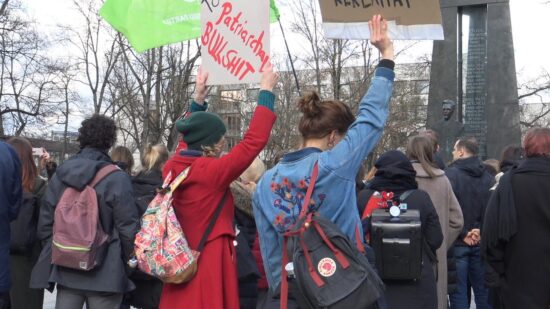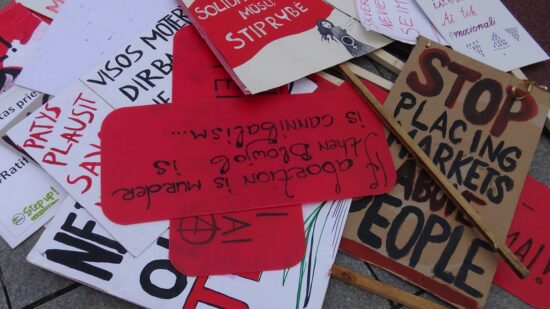OPINION | WOMEN’S RIGHTS | FREE SPEECH | HUMAN RIGHTS
◊
by Vilma Fiokla Kiurė
◊
Finally, a “feminine government” for Lithuania. Having won the 2020 election, the right-wing parties formed a “feminine” government, led by Prime Minister Ingrida Šimonytė, with liberal Viktorija Čmilytė-Nielsen taking the chair of the Speaker of the Seimas. One could be tempted to see this as a victory for liberalism and feminism in the Baltics, since the Social Democrats, who were in the majority for several terms, would either include no women in their government or at best, entrust to them one or two ministries of lesser importance.
And now, suddenly, women became ministers of such fields as Justice, the Interior, Economy, and Social Security: this had not been seen before. As soon as they took the chairs, these young and brave professionals experienced quite some pressure from the traditionalists because of their age and/or gender. Minister of Justice Evelina Dobrovolska became the main target: she was open not only about her tolerant attitude to ethnic and sexual minorities, but also about her tattoos. The name-calling ensued.
At the moment, Minister of the Interior Agnė Bilotaitė receives the most criticism. She has had more than one occasion to claim that she is attacked because of her gender. That, in fact, is not particularly hard to believe when listening to statements of male politicians, who do not feel the need to think twice before publicly announcing that crisis management is too much of a burden for fragile feminine shoulders. In the meanwhile, Lithuania is experiencing two crises: the complicated migrant crisis and the covid crisis. The “feminine government” is facing many challenges, and the traditionalists are not missing the opportunity to home in with acute criticism.
This opportunity was also seized by movements like the Lithuanian “Family Movement” (Lietuvos šeimų sąjūdis), openly and exclusively directed against the “women’s government.” The new movement is supported by President Gitanas Nausėda, who does not shy away from populism and direct confrontation with the executive power. A congratulatory speech by the traditionalist president could be heard in the rally of the Family March (Šeimų maršas) this May. It was organized by the aforementioned Lithuanian Family Movement. During the rally, nationalist and anti-vaxer speeches were given, too, and homophobic propaganda was spread among the crowd. Even contemporary art was targeted at this rally. Lithuanian artist Dainius Liškevičius was subjected to persecution after a video recording of his performance was screened to the crowd. The performance was created twenty years ago with the aim of criticizing nationalism. And so, understandably, the artist became an enemy of the ultra-right. Furthermore, complaints against Liškevičius for desecration of national symbols were filed with the police. An investigation was initiated and the artist had to hire a lawyer… The whole situation is odd to say the least: it is quite unbelievable that people can still be dragged into court for their art in contemporary Lithuania.
“Complaints against Dainius Liškevičius for desecration of national symbols were filed with the police. An investigation was initiated. Unbelievable that people can still be dragged into court for their art in contemporary Lithuania.”
A while later, in August, the same people organized a rally near the Seimas that ended in a riot. In the rally, the anti-vaxers compared themselves to Holocaust victims; it was quite a sight to see: the far-right homophobes suddenly identifying with a group they are so fond of belittling and targeting.
The rally was exceptionally anti-state and the speeches were abundant with statements on how the “women’s government” is weak and should be replaced by a masculine strong-arm government.
The situation is unprecedented, and somewhat confounding, not only because the “women’s government” is that of the right-wing (!), but also because those who want to topple it employ anti-feminist arguments. This had not been seen in Lithuania before, either.
What are the benefits of a feminine government? What has changed in the political life of Lithuania?
I would say that there have not been many changes that benefit women, yet, but we can feel a little cozier in Lithuania and be less afraid that misogynistic laws could be passed here – as has been the case in Poland.
While out sisters in Poland are grieving the victims of the new abortion laws (that strike poor women particularly), Lithuanian women can enjoy a legal protection from stalking. This October, the Seimas added an article on unlawful stalking of persons to the Penal Code. From now on, in Lithuania, anyone who is stalking or psychologically terrorizing their neighbor, will be punishable by law. This is an important victory for women, because they are usually the ones subjected to psychological terror by former spouses or partners.
The statistics are clear: women and children have been harmed by the coronavirus pandemic the most. Poverty and the problem of the position of women have not been solved and it seems that this will not change anytime soon.
On average, women still earn much less than men and, indeed, women’s social problems were pushed to the background by various crises and the pandemic.
On March 8, 2020, International Day of Women’s Solidarity, there was a march underway in Kaunas; on March 8, 2021, no significant events took place. The pandemic and the lockdowns got in the way.
However, it is good to see that women’s activism did not die: it moved to social media and print media.
For example, a recent issue of the left-wing magazine Lūžis was dedicated to the topic of feminism.
Women’s rights are more and more often discussed on the air of the national TV and radio channel, LRT. I can say that, in general, we are moving in the right direction, and we can be more and more optimistic about the future of women in Lithuania.

